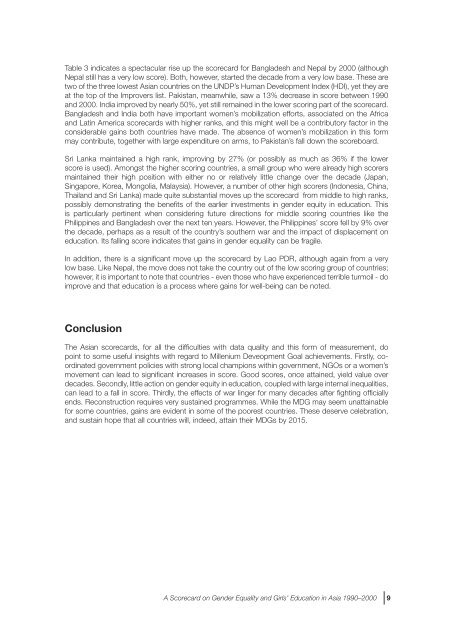A Scorecard on gender equality and girls ... - unesdoc - Unesco
A Scorecard on gender equality and girls ... - unesdoc - Unesco
A Scorecard on gender equality and girls ... - unesdoc - Unesco
You also want an ePaper? Increase the reach of your titles
YUMPU automatically turns print PDFs into web optimized ePapers that Google loves.
Table 3 indicates a spectacular rise up the scorecard for Bangladesh <strong>and</strong> Nepal by 2000 (although<br />
Nepal still has a very low score). Both, however, started the decade from a very low base. These are<br />
two of the three lowest Asian countries <strong>on</strong> the UNDP’s Human Development Index (HDI), yet they are<br />
at the top of the Improvers list. Pakistan, meanwhile, saw a 13% decrease in score between 1990<br />
<strong>and</strong> 2000. India improved by nearly 50%, yet still remained in the lower scoring part of the scorecard.<br />
Bangladesh <strong>and</strong> India both have important women’s mobilizati<strong>on</strong> efforts, associated <strong>on</strong> the Africa<br />
<strong>and</strong> Latin America scorecards with higher ranks, <strong>and</strong> this might well be a c<strong>on</strong>tributory factor in the<br />
c<strong>on</strong>siderable gains both countries have made. The absence of women’s mobilizati<strong>on</strong> in this form<br />
may c<strong>on</strong>tribute, together with large expenditure <strong>on</strong> arms, to Pakistan’s fall down the scoreboard.<br />
Sri Lanka maintained a high rank, improving by 27% (or possibly as much as 36% if the lower<br />
score is used). Am<strong>on</strong>gst the higher scoring countries, a small group who were already high scorers<br />
maintained their high positi<strong>on</strong> with either no or relatively little change over the decade (Japan,<br />
Singapore, Korea, M<strong>on</strong>golia, Malaysia). However, a number of other high scorers (Ind<strong>on</strong>esia, China,<br />
Thail<strong>and</strong> <strong>and</strong> Sri Lanka) made quite substantial moves up the scorecard from middle to high ranks,<br />
possibly dem<strong>on</strong>strating the benefits of the earlier investments in <strong>gender</strong> equity in educati<strong>on</strong>. This<br />
is particularly pertinent when c<strong>on</strong>sidering future directi<strong>on</strong>s for middle scoring countries like the<br />
Philippines <strong>and</strong> Bangladesh over the next ten years. However, the Philippines’ score fell by 9% over<br />
the decade, perhaps as a result of the country’s southern war <strong>and</strong> the impact of displacement <strong>on</strong><br />
educati<strong>on</strong>. Its falling score indicates that gains in <strong>gender</strong> <strong>equality</strong> can be fragile.<br />
In additi<strong>on</strong>, there is a significant move up the scorecard by Lao PDR, although again from a very<br />
low base. Like Nepal, the move does not take the country out of the low scoring group of countries;<br />
however, it is important to note that countries - even those who have experienced terrible turmoil - do<br />
improve <strong>and</strong> that educati<strong>on</strong> is a process where gains for well-being can be noted.<br />
C<strong>on</strong>clusi<strong>on</strong><br />
The Asian scorecards, for all the difficulties with data quality <strong>and</strong> this form of measurement, do<br />
point to some useful insights with regard to Millenium Deveopment Goal achievements. Firstly, coordinated<br />
government policies with str<strong>on</strong>g local champi<strong>on</strong>s within government, NGOs or a women’s<br />
movement can lead to significant increases in score. Good scores, <strong>on</strong>ce attained, yield value over<br />
decades. Sec<strong>on</strong>dly, little acti<strong>on</strong> <strong>on</strong> <strong>gender</strong> equity in educati<strong>on</strong>, coupled with large internal inequalities,<br />
can lead to a fall in score. Thirdly, the effects of war linger for many decades after fighting officially<br />
ends. Rec<strong>on</strong>structi<strong>on</strong> requires very sustained programmes. While the MDG may seem unattainable<br />
for some countries, gains are evident in some of the poorest countries. These deserve celebrati<strong>on</strong>,<br />
<strong>and</strong> sustain hope that all countries will, indeed, attain their MDGs by 2015.<br />
A <str<strong>on</strong>g>Scorecard</str<strong>on</strong>g> <strong>on</strong> Gender Equality <strong>and</strong> Girls’ Educati<strong>on</strong> in Asia 1990–2000 9

















